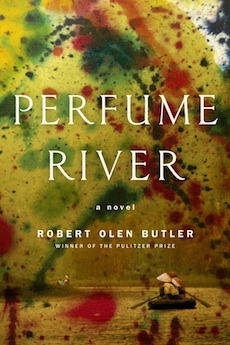By David Madden
What may readers well expect from a 1993 Pulitzer Prize winner who has published 16 novels and six collections of stories since 1981? Robert Olen Butler’s answer is Perfume River.
The protagonist is Robert Quinlan, a Vietnam War veteran, seventy, who has never recovered from losing his Vietnamese lover. He teaches history and his wife, Darla, teaches art history at Florida State University. Butler submerges his readers in the mental and physical processes of key characters, including Robert’s brother, Jimmy, and his wife Linda, a couple who fled the draft to Canada.
Butler views Robert and Jimmy’s parents mostly from the outside—the aloof, demanding father, a gung-ho veteran of WW II, who is dying, and the needy mother, Peggy.
After some 46 years, Jimmy finally appears. He and Robert interact as their father lies dying and their mother is pre-grieving.
A mysterious hovering presence is Bob, apparently homeless, whom Robert Quinlan takes to be a mentally damaged Vietnam veteran, but whom the reader knows to be a man whose father, a Vietnam vet, was abusive.
Bob’s path crosses Robert’s one last time. He appears at the funeral home. Veteran or not, Bob is a symbolic “vector” for the suffering of friends and enemies, veterans and nonveterans, suffused with the aging process.
The changes in Robert and Darla are more through shifting perspectives and insights than through action.
The author creates the voice of an omniscient persona, a voice so meshed with his rendering of his characters’ complex thoughts and relatively simple actions, which are fused, that one might best regard Perfume River as a meditation, in an analytical but also lyrical style that is more the author’s than the characters’.
The novel’s style lends itself to numerous vignettes of six pages, on average, and the absence of chapter breaks. Brevity serves Butler’s intentions well. The novel deals with only a few days in the present, rendering fragments of the long past, at the short length of 273 pages.
The author adroitly sustains the reader’s immersion in the psychological turmoil and anguish of his characters, all of whose lives are still being affected in complex, sometimes very quiet ways, by the legacy of the Vietnam War, which has, clearly, affected Butler himself.
Butler won the Pulitzer Prize in 1993 for A Good Scent from a Strange Mountain, short stories about Vietnamese immigrants in Louisiana, and many other awards after that. Among his other works of fiction are A Small Hotel (2011), The Star of Istanbul (2013), and Hell (2009).
He teaches creative writing at Florida State University, employing his own unique method with great success.
Among writers who give public readings from their work, Butler, trained as an actor, is one of the most effective, and he is known to be a powerful teacher. He has described his understanding of the creative process in From Where You Dream (2005). “Please get out of the habit of saying that you’ve got an idea for a short story. Art does not come from ideas. Art does not come from the mind. Art comes from the place where you dream. Art comes from your unconscious; it comes from the white-hot center of you. Does this make sense?”
David Madden (ΦBK, University of Tennessee, 1979) is the author of eleven novels and three collections of stories. Forthcoming in June is his collection of four novellas, Marble Goddesses and Mortal Flesh.




